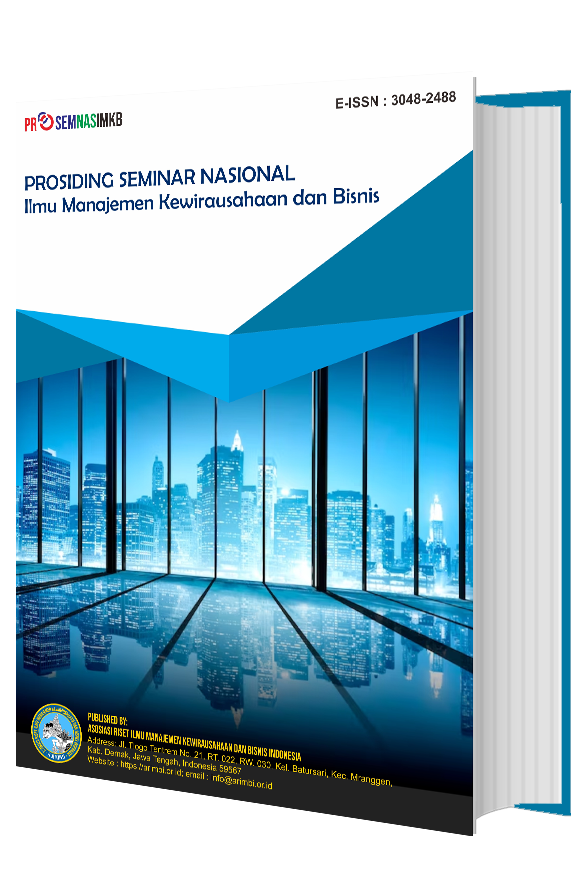Bahasa Inggris sebagai Katalis Perubahan: Memberdayakan Mahasiswa Manajemen Indonesia untuk Mendorong Pertumbuhan Ekonomi Berkelanjutan
DOI:
https://doi.org/10.61132/prosemnasimkb.v1i1.14Keywords:
business communication, classroom action research, English language learning, management students, sustainabilityAbstract
This classroom action research aimed to explore an innovative approach to teaching English that specifically targets the development of communication skills required for implementing sustainable business strategies. The study was conducted at the Sekolah Tinggi Ilmu Ekonomi Pariwisata Indonesia (STIEPARI) Semarang, involving 30 management students. The research employed a mixed-methods approach, collecting data through surveys, interviews, classroom observations, and English proficiency tests. The findings revealed that the innovative teaching method, which integrated sustainability concepts and focused on developing relevant business communication skills, effectively enhanced students' English competence and understanding of applying sustainability concepts in business. The increased English proficiency positively impacted students' comprehension and ability to implement sustainability principles in business contexts. The study concludes that integrating sustainability concepts into English language learning for business purposes is an effective strategy for developing management students' competencies as change agents in promoting sustainable business practices. Recommendations for future research include expanding the sample, conducting longitudinal studies, exploring teachers' perspectives, and collaborating between business management academics and English language experts.
Downloads
References
Alisjahbana, A. S., et al. (2017). Menyongsong SDGs: Kesiapan Daerah-daerah di Indonesia. Unpad Press.
Andi, K., & Arafah, B. (2017). Using needs analysis to develop English teaching materials in initial speaking skills for Indonesian college students of English. The Turkish Online Journal of Design, Art and Communication TOJDAC, April, 419–437. https://s.docworkspace.com/d/AEPQKO3Sl_1J4tLyrYunFA
Astawa, N. L. P. N. S. P., et al. (2024). Sustainable development goals in EFL students’ learning: A systematic review. Pegem Journal of Education and Instruction, 14(2). https://doi.org/10.47750/pegegog.14.02.01
Badan Pusat Statistik. (2021). Pertumbuhan ekonomi Indonesia triwulan IV-2020. https://www.bps.go.id/pressrelease/2021/02/05/1811/ekonomi-indonesia-2020-turun-sebesar-2-07-persen--c-to-c-.html
Barkhuizen, G. (Ed.). (2019). Qualitative research topics in language teacher education. Routledge. https://doi.org/10.4324/9780429461347
Braun, V., & Clarke, V. (2021). Thematic analysis: A practical guide. SAGE Publications Ltd.
Burns, A. (2019). Action research in English language teaching: Contributions and recent developments. In X. Y. (Ed.), Handbook of Applied Linguistics (pp. 991–1005). https://doi.org/10.1007/978-3-030-02899-2_52
Cohen, L., et al. (2017). Research methods in education. Routledge. https://doi.org/10.4324/9781315456539
Council of Europe. (2001). Common European framework of reference for languages: Learning, teaching, assessment. Cambridge University Press. https://doi.org/10.1002/9781118784235.eelt0114.pub2
Coyle, D., et al. (2020). CLIL: Content and language integrated learning. Cambridge University Press.
Creswell, J. W., & Creswell, J. D. (2018). Research design: Qualitative, quantitative, and mixed methods approaches (5th ed.). SAGE Publications, Inc.
Dudley-Evans, T., & St John, M. J. (2018). Developments in English for specific purposes: A multi-disciplinary approach. Cambridge University Press.
Elkington, J. (2018). 25 years ago I coined the phrase “Triple bottom line.” Here’s why it’s time to rethink it. Harvard Business Review. https://hbr.org/2018/06/25-years-ago-i-coined-the-phrase-triple-bottom-line-heres-why-im-giving-up-on-it
Ellis, M., & Johnson, C. (2020). Teaching business English. Oxford University Press.
English First. (2020). EF English proficiency index. https://www.ef.com/wwen/epi/
Epstein, M. J., & Buhovac, A. R. (2021). Making sustainability work: Best practices in managing and measuring corporate social, environmental, and economic impacts (3rd ed.). Berrett-Koehler Publishers.
Etikan, I. (2016). Comparison of convenience sampling and purposive sampling. American Journal of Theoretical and Applied Statistics, 5(1), 1. https://doi.org/10.11648/j.ajtas.20160501.11
Galloway, N., & Numajiri, T. (2020). Global Englishes language teaching: Bottom‐up curriculum implementation. TESOL Quarterly, 54(1), 118–145. https://doi.org/10.1002/tesq.547
Gayatri, P., et al. (2023). Sustainable EFL blended education in Indonesia: Practical recommendations. Sustainability, 15(3), 2254. https://doi.org/10.3390/su15032254
Gunina, N., et al. (2021). Integrating sustainability issues into English language courses at university. E3S Web of Conferences, 295, 05006. https://doi.org/10.1051/e3sconf/202129505006
Karimi, S., & Naghibi, H. S. (2015). Social media marketing (SMM) strategies for small to medium enterprises (SMEs). International Journal of Information, Business and Management, 07(04), 86–98.
Kementerian Perencanaan Pembangunan Nasional. (2019). Rancangan teknokratik rencana pembangunan jangka menengah nasional 2020-2024. Bappenas.
Kementrian Pendidikan dan Kebudayaan. (2020). Rencana strategis Kemendikbud 2020-2024. Kementerian Pendidikan dan Kebudayaan.
Kemmis, S., et al. (2014). The action research planner. Springer Singapore. https://doi.org/10.1007/978-981-4560-67-2
Neeley, T. (2017). The language of global success: How a common tongue transforms multinational organizations. Princeton University Press.
Richards, J. C., & Rodgers, T. S. (2014). Approaches and methods in language teaching. Cambridge University Press. https://doi.org/10.1017/9781009024532
United Nations. (2015). Transforming our world: The 2030 agenda for sustainable development. https://sdgs.un.org/2030agenda
Wahyuni, D. S., et al. (2023). Integrating sustainability in ELT. In Proceedings of the 20th AsiaTEFL-68th TEFLIN-5th iNELTAL Conference (ASIATEFL 2022) (pp. 119–127). Atlantis Press. https://doi.org/10.2991/978-2-38476-054-1_11
Wahyuningsih, S., & Untsa, F. Z. (2023). English as business lingua franca: Examining the use of English in Indonesian online business. ELT-Lectura, 10(2), 96–104. https://doi.org/10.31849/elt-lectura.v10i2.13699
Wheelen, T., et al. (2017). Strategic management and business policy: Globalization, innovation and sustainability (15th ed.). Pearson Education.
Widiastuti, I. A. M. S., et al. (2021). The roles of English in the development of tourism and economy in Indonesia. SOSHUM: Jurnal Sosial dan Humaniora, 11(3), 305–313.
Yu, B., et al. (2024). Sustainability in English language teaching: Strategies for empowering students to achieve the sustainable development goals. Sustainability, 16(8), 3325. https://doi.org/10.3390/su16083325
Zainuddin, Z. (2023). The use of English in the ASEAN economic community (AEC). Ar-Ribhu: Jurnal Manajemen dan Keuangan Syariah, 4(2), 86–99.
Downloads
Published
How to Cite
Issue
Section
License
Copyright (c) 2024 Prosiding Seminar Nasional Ilmu Manajemen Kewirausahaan dan Bisnis

This work is licensed under a Creative Commons Attribution-ShareAlike 4.0 International License.






